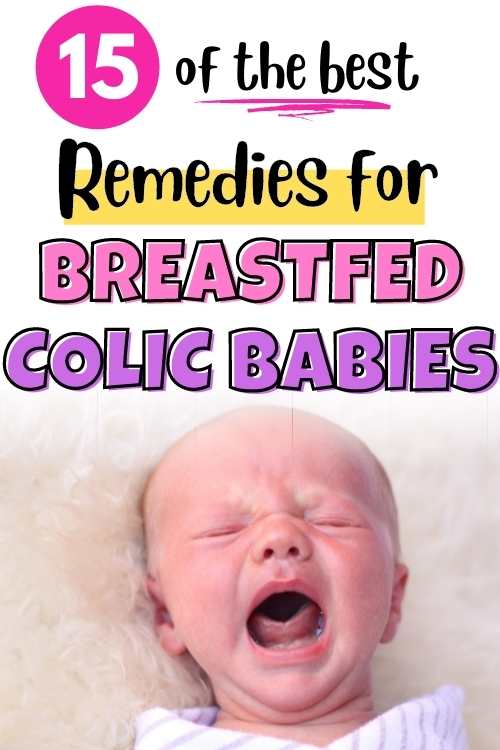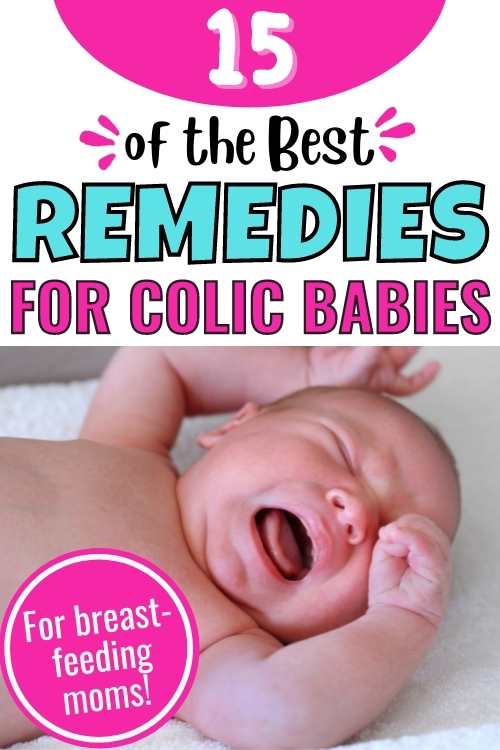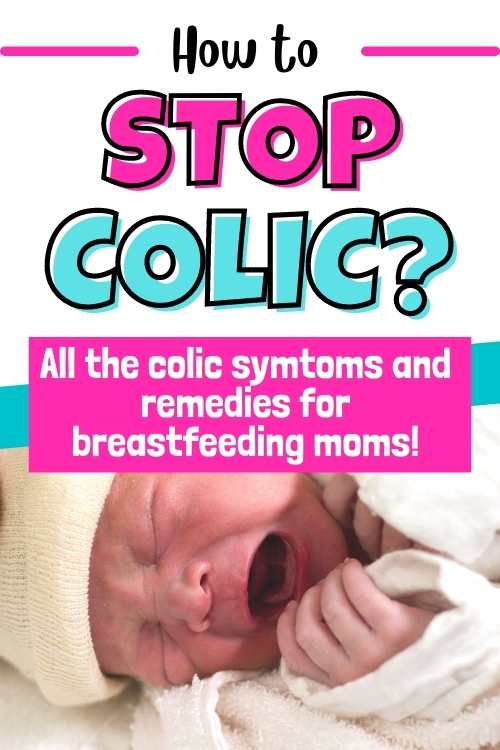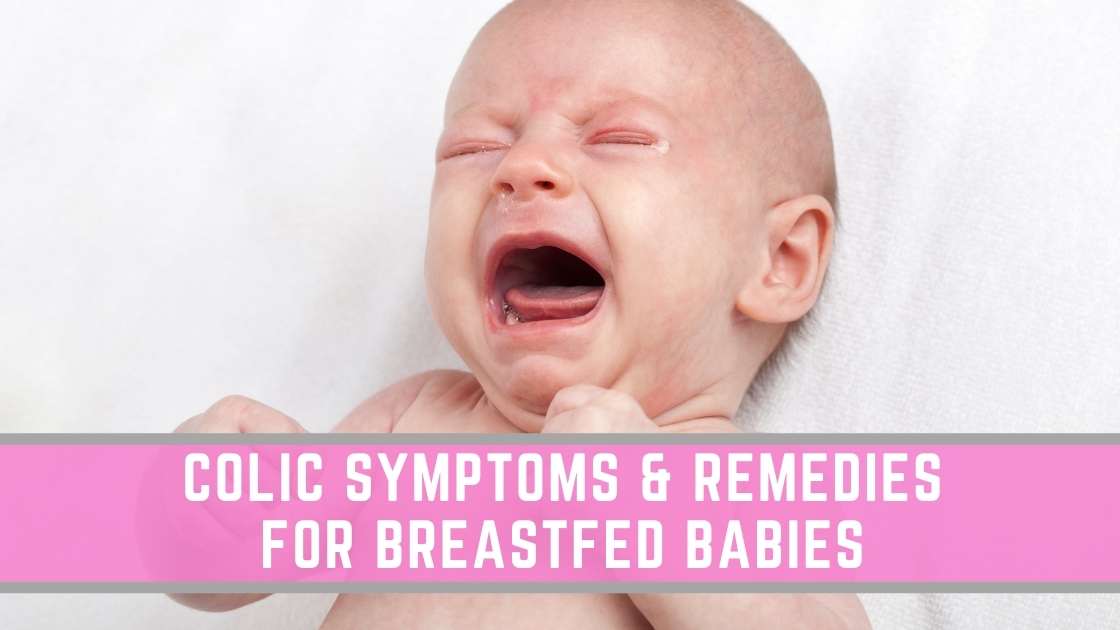Are you in the thick of the first few weeks with a newborn and struggling because your breastfed baby is constantly crying for long period of times and you can’t seem to understand why or what to do to make it better? I have been there mama, I know how excruciating that is. So tiring and I often used to feel like such a failure.
The good news is that you are not alone: there are so many other new moms going through the same thing all other the world. And there’s something that you can do about it.
First of all, if your baby is crying so much, there’s a good chance that your baby is experiencing what’s called colic, which is a condition that is quite common amongst newborns (both breastfed or bottle-fed), affecting between 10% and 40% of infant. If that is the case, then there are remedies that you try. If not colic, there’s still lots of different techniques and tips that you can go through to soothe your crying baby.
In this article, I am going to focus on breastfed babies with colic. While colic can affect bottle-fed babies as well, some symptoms and remedies differ depending on the feeding method.
I will take you through all the colic symptoms in breastfed babies, so that you can have a better idea if that’s what you are dealing with, or if you need to look at something else. Plus I am going to go through all the colic remedies for breastfed babies and other things that you can do to prevent colic in the first place.
Related:

What is Colic?
First thing first, let me make it clear as to what colic actually is.
While having a baby crying a lot can be very stressful and might make you thing that it’s colic, it may just be that your baby is hungry, needs changing, or something else. Identifying the type of crying when taking care of a newborn, particularly if you are a first-time mom, can be hard, but it’s important to understand why your baby is upset before you jump to any conclusion.
In general, colic is defined as intense and prolonged crying in infants without any obvious reason. It follows the “rule of threes”, meaning that it happens when:
- Baby is crying for three or more hours a day
- Three or more days a week
- And for more than three weeks.
Colic can happen at any time of the day, but it’s usually worse in the evening or at night. It also usually starts when a baby is 2 to 3 weeks old, peaking at 6 weeks, and subsides by 3-4 months of age. However, there are some babies that keep experiencing colic even when they are older than that.
It’s also important to understand that babies with colic usually eat and grow normally. If your baby is not gaining weight as they should, then you should talk to your pediatrician and seek medical advice.
Can Breastfed Babies get Colic?
While some experts believe that colic is the result of an allergy to some proteins in cow’s milk in formula-fed babies, colic can affect breastfed babies as much as formula-fed ones. So, yes, a baby can get colic from breastfeeding.
That said, this study found a significant difference in the time when colic peaks between formula-fed and breastfed babies. According to the study, formula-fed babies peak much earlier than a breastfed baby with colic: at around 2 weeks instead of the believed 6 weeks.
Colic Symptoms in Breastfed Babies
We looked earlier at what defines colic exactly: very intense crying lasting for a prolonged period of time. However, here’s some other symptoms that you can look out for in breastfed babies to understand whether they have colic or not:
- Bright red or flushed face when crying
- Clenched fists
- Arched back
- Curled up legs toward their tummy
- Baby burping often or passing a lot of gas (this is because baby is swallowing lots of air while crying)
- Inconsolable: nothing that you do seems to make it better
Colicky babies also have a very high-pitched crying that sounds more urgent compared to regular crying.

What Causes Colic in Breastfed Babies
While there are no real known reasons as to why some babies get colic and some don’t, here’s some of the things that are believed to cause colic in breastfed babies.
1) Overactive Letdown
Having an overactive letdown means that your body is producing too much milk, or that you have an oversupply of it. You know, when your boobs have exploded in size since you’ve given birth?! The milk then flows out of your breast and into your baby’s mouth very fast.
This usually happens 4-6 weeks postpartum, right when colic is at its pick, and it’s the result of your body trying to make sure that baby has enough supply. You body is still adjusting to how much it needs to produce to meet baby’s demands.
While this can be a good thing, compared to experiencing a drop in milk supply, it can also have the side effect of causing your baby to be gassy or colicky. This happens because your baby is gulping to keep up with the flow and ingesting too much air, plus he/she is consuming too much foremilk and not enough hindmilk.
Foremilk is the milk that baby drinks at the beginning of a feeding and it consists of mostly water combined with other nutrients. Whereas hindmilk is highly fatty and is the one that actually provides nourishment and satiety.
Foremilk gets digested very quickly compared to hindmilk, and this can result in constant hunger, excess gas and colic.
3) Diet of the Breastfeeding Mom
When you have a breastfed baby with colic, it’s important to understand that whatever the breastfeeding mom will eat or drink will also make it’s way to your baby via the breast milk. And, as a consequence, some babies can have an allergic reaction to some of the foods that you’ve ingested.
There is therefore a theory according to which allergenic foods in the breastfeeding mom diet can cause digestive problems in their breastfed babies, leading to colic.
This theory is actually backed up by multiple studies, like this one from 2005 and this one from 2012. Both studies concluded that the exclusion of certain foods from the maternal diet was associated in a reduction in colic-like symptoms.
What Foods Cause Colic in Breastfed Babies?
No study is really conclusive in giving recommendations about what diet a breastfeeding mom should follow. However, as a general guidance, foods to avoid while breastfeeding a colicky baby are:
- Dairy products
- Allergenic foods such as nuts, soy, eggs or shellfish
- Foods and drinks that contain caffeine, such as coffee, tea or sodas
- Vegetables that may cause gas, such as cauliflower or broccoli
- Spicy foods
- Garlic
- Fruits that contain large amount of citric acid, such as citrus fruits or berries
You don’t need to eliminate them all at once, but try eliminate one at the time (starting with allergenic foods) for a period of about a week, and see if that improves symptoms in your colicky and breastfed baby. If not, try move on to the next.

3) Baby is Sensitive to Gas
There’s a lot of confusion as to whether it’s the gas that causes colic in breastfed babies or not. Some people think that might be the cause and wonder if breast milk itself can cause gas in infants. However, there is no evidence or studies at all to support this.
That said, studies have found a correlation between colic in babies and a bacteria imbalance in their gut that can cause gas as well as inflammation. Plus, babies that cry a lot do tent to swallow lots of air and have gas in their tummy as a result.
So, while gas may not be the direct cause, it is often associated with colic in both breastfed babies and botte-fed babies.
4) Baby is Still Adjusting to the World
There’s a lot to take in for newborns when they come into the world, with all the lights and noises and new people. And some infants just need more time to adjust to this new life and can’t handle it very well at the beginning.
So, one of the theories on what causes colic in breastfed babies (but also bottle-fed babies) is that babies are struggling to get accustomed to the world. And, because little babies can’t talk and express their feelings at that age, crying becomes their way of externalizing them.
5) Baby can’t Calm Themselves
Another theory is that some infants take longer than others to learn how to self-soothe or calm themselves down These babies are usually very sensitive to stimulation and it won’t be until they are a bit older that they can learn how to control their nervous system and not get so overwhelmed in certain situations.

Colic Remedies for Breastfed Babies
Unfortunately, there’s no actual cure for baby colic. However, there are some things that you can do to provide relief to your baby and soothe them.
Here’s some of the best tips on how to relieve your baby’s colic fast.
1) Burp your Baby Frequently
Breastfed babies don’t usually need to be burped as frequently as bottle-fed babies, because they don’t tend to inhale as much air when feeding. This is particularly true compared to bottle-fed babies who are fed the traditional way instead of with paced bottle feeding.
However, we’ve seen how when babies that cry for a prolonged period of time tend to swallow lots of air, which can lead to gas in their tummy and discomfort. Plus colicky babies are more likely to have bacteria in their guts that cause gas.
So, while burping your baby frequently will not necessarily eliminate colic, it is a good remedy to use to prevent any symptoms from getting worse and to help your baby stop crying.
2) Use the Football Hold
Because of all the gas that colicky baby end up having in their tummy from all the crying, another of the best colic remedies for breastfed babies is to hold them in the football hold position. This involved holding your baby across your arm facing down, with their legs straddling your elbow and the side of their face in your hand.
Not to be confused with the breastfeeding position ‘football hall’, where baby is tucked under your arm off to the side when you are nursing!
This position helps by putting gentle pressure on their tummy and this keeps the gas moving.

3) Check Baby is Latching on Properly
Because the theory for which gas causes colic in infants hasn’t been ruled out yet, another tip to reduce the risk of colic in breastfed babies is to make sure your baby is latching on properly when feeding. If not, they might be swallowing in a whole lot of air with the breastmilk, which can cause gas.
Not to mention that if your baby is not latching on properly, then you’ll probably start experiencing very sore nipples soon! Unless you have already started experiencing the pain… (I hated the excruciating nipples from breastfeeding the first few months postpartum!).
If you are not too confident about achieving a correct latch, I would strongly recommend you talk to a lactation consultant or enroll in a breastfeeding course. I have actually put together a list of the best online breastfeeding courses here (including free classes) that you can look at.
Really don’t beat yourself up for asking for help with breastfeeding. I know lots of mom (me included) think that breastfeeding is something that will come naturally, and I personally felt ashamed asking for help and talking to a lactation consultant. But it was by far the best think I ever did for my breastfeeding journey!
Related:
- 20+ Best Online Breastfeeding Courses (FREE Classes too!)
- Sore Nipples While Breastfeeding?! 15 Tips that Saved Me!
4) Feed Baby in a Reclined Position
Feeding baby in a reclined position, also called laid-back feeding position, is one of the best tips on how to deal with overactive letdown and also get relief from sore nipples while breastfeeding. So, if you think your baby’s colic is due to your oversupply of milk, this is definitely something that you should try.
You lie back in a reclined position (bed or couch for example) and have baby lying on you you so you are facing each other. Then let baby latch on to the breast themselves.
Breastfeeding a colicky baby this way uses gravity to slow the flow of milk into baby’s mouth, so that baby doesn’t have to gulp to keep up with the flow.
You could also try pulling baby off at letdown and re-latch baby when letdown is complete. Or you could offer just one breast per feeding to make sure baby gets all the hindmilk.
However, be careful in offering only one breast during those early postpartum stages and with an oversupply of milk: the last thing you want is end up with a clogged duct or engorged breast! To avoid that, you could pump on the other breast.

5) Give Baby Probiotics
Some parents with breastfed babies with colic may receive the recommendation to give baby the probiotic Lactobacillus reuteri as a colic baby treatment. However, there are some contradictory studies about the effectiveness of this probiotic in relieving babies from colic symptoms.
For example, this study from 2011 on 50 exclusively breastfed babies with colic found that infants who were given the probiotics reported a significant reduction (50%) in crying time. But this 2014 study found no improvement at all in babies taking Lactobacillus reuteri, whether breastfed or breastfed.
One of the latest studies on the subject is from 2018 and seems very promising though. The study involved 345 babies with colic (both breastfed and bottle-fed) and the results showed that the probiotics are very effective in reducing crying and fussing, particularly in breastfed babies. Formula-fed babies, on the other hand, didn’t seem to be affected at all.
As such, if you do have a colicky baby, I would definitely encourage you to try this as a colic relief for breastfed babies!
Other Tips to Soothe Colicky Babies
Other than what’s listed above, there’s other tips and general soothing techniques that you can try to calm your baby down. Here’s some suggestions, but you can also check out these tips on how to soothe a crying baby for more information.
- Make sure your baby isn’t hungry by offering them your breast – it may even be that sucking on the breast is comforting for them
- Rock your baby: you can try a baby bouncer or rock them in your arms
- Carry your baby in a baby carrier, baby wrap or hip seat carrier and go for a walk, either outside or around the house
- Distract your baby by giving them something interesting to look at: you can try with different colors, shapes or textures
- Give your baby a warm bath: this helps calming them down and it’s a good part of an evening routine
- Turn on some white noise: this helps baby feel like they are back in your belly. You can try the vacuum cleaner, a fan, YouTube or, even better, a white noise machine! I used the Hushh portable white noise machine and loved how I could take it with me wherever I want.
- Go for a ride in your car: I am yet to know a baby that doesn’t calm down and stops crying in the car
- Use a pacifier: just be mindful that introducing a pacifier before you’ve got the hang of breastfeeding (usually when your baby is 3-4 weeks old) can negatively affect your ability to breastfeed. This is because the sucking on a pacifier is different to the sucking for breastfeeding, and this can get your baby confused (also called “nipple confusion”)
Also, do not feel like you need to swap from breast to bottle! There is no evidence at all that breastfeeding is more likely to cause colic compare to formula feeding! On the contrary, it may even make the situation worse.
And, last but not least, get as much help as you can. Dealing with a colicky baby is very hard, tiring and stressful – believe me, I know! The best thing that you can do is actually accept some help from a friend or family member if you can, and get a rest yourself.
Take that time to rest, go for a walk, or do anything else that might take your mind off for a while and allow you to catch a breath and recharge.
Related:
How to Prevent Colic in Breastfed Babies
If you are wondering what you can do to prevent colic in breastfed babies, instead of just treating it with the remedies listed above, here some of my best tips. I have already touched on most of these above, but here’s exactly what you can do:
- Assess your diet and find out if your baby is being fussier and/or crying more when you are eating specific foods. You should pay particular attention to foods that are likely to cause an allergic reaction, such as dairy, eggs or nuts. Try eliminate them from your diet and see if there’s any improvement
- Make sure your are breastfeeding properly by achieving a good latch, as to minimizing the possibility of your baby swallowing in too much air, which could cause gas
- Breastfeed in a reclined position to slow down your flow in case you have an overactive letdown or oversupply of milk
In general, try to identify the cause of colic (via an elimination process) and work on that. See if you can point it down to your baby being too gassy, allergy to certain foods, or if the problem is in your milk overproduction.
It’s easier to act on some of the causes than others to prevent colic in breastfed babies from happening. If colic seems to be the result of your baby still adjusting to the world or their inability to self-soothe, then all you can probably do is be patient and try all the remedies and soothing techniques listed above.
Colic Symptoms & Remedies for Breastfed Babies: Final Thoughts
Here it is mama, a list of all the colic symptoms in breastfed babies and remedies that you can try to relieve the discomfort in your little baby. I hope this helps you deal with all the non-stop crying and hopefully make it much better.
Remember that what works for one baby may not work for another, so don’t compare yourself to other parents. Particularly those who like to brag about their success stories with their children!
And remember to be patient. I know it’s super hard at the beginning. So much to learn and think about when you have a new little human enter your world, and all the crying from colic makes it feel impossible sometimes.
But remember that it will pass and it’s not going to last for long. Really try to rest as much as you can while you are weathering the storm and get as much help as you can from any family, friends or professionals. There’s nothing wrong in asking for help!
For more tips and information on how to survive the first few months with a new baby, check out these related articles:
- 8 Tips for New Parents to Avoid Sleep Deprivation
- 18 Tips on How to Soothe a Crying Baby
- Sore Nipples While Breastfeeding?! 15 Tips that Saved Me!
- 6 Tips For First Time Moms (Practical Advice To Help New Moms Adjust)
- 26 Baby Diaper Blowout Hacks & Tips (NO more Mess!)
- How to Survive the First 3 Months with a Newborn
- Baby Waking Up Multiple Times a Night: here’s what you need to know
Are you a breastfeeding mom struggling with a colicky baby and have some more questions that haven’t been answered above? Or do you know of any other colic remedies for breastfed babies that are not listed here? Then please let me know in the comments below – I’d love to hear from you!



Ugh Colic! A parent’s nightmare – we found the football hold really helpful too. Great tips.
My baby suffered a lot. I wish I got to read this article a year ago maybe !